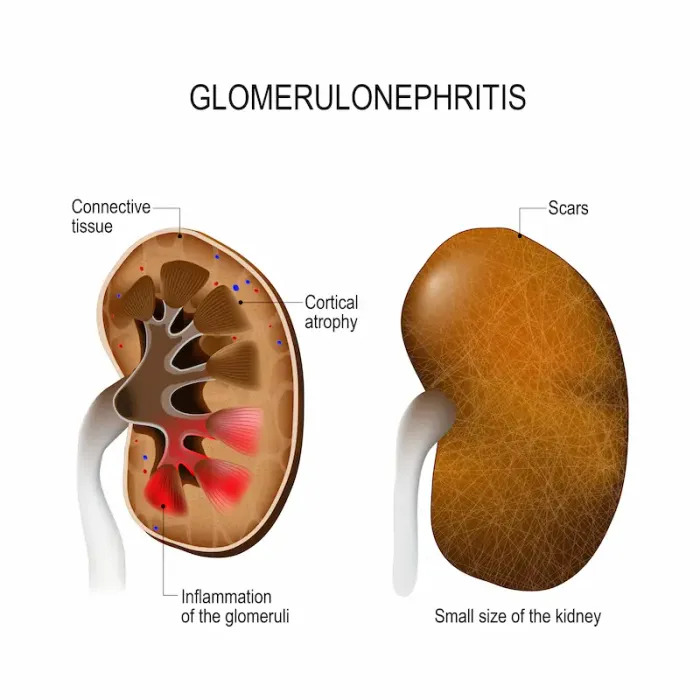Understanding Glomerulonephritis and Its Management
Glomerulonephritis is a kidney condition that affects the glomeruli, leading to inflammation and impaired kidney function. Learn about its types, symptoms, causes, diagnosis methods, and available management strategies.

Written by Dr. Mohammed Kamran
Reviewed by Dr. Rohinipriyanka Pondugula MBBS
Last updated on 13th Jan, 2026

Glomerulonephritis is a condition that affects the kidneys, specifically the tiny filters called glomeruli. These filters are responsible for removing waste and excess fluids from your blood. When they become inflamed or damaged, it can lead to serious health issues. If you or a loved one has been diagnosed with glomerulonephritis, understanding the condition, its symptoms, causes, and management can help you take better control of your health.
What is Glomerulonephritis?
Glomerulonephritis (often called "GN") refers to inflammation of the glomeruli, the tiny filtering units in your kidneys. When these filters are damaged, your kidneys struggle to remove waste and excess fluids from your blood, leading to complications like high blood pressure, swelling, and even kidney failure if left untreated.
There are two main types of glomerulonephritis:
1. Acute Glomerulonephritis: This develops suddenly, often after an infection like strep throat or a skin infection.
2. Chronic Glomerulonephritis: This develops slowly over time and may not show symptoms until significant kidney damage has occurred.
What Causes Glomerulonephritis?
The exact cause can vary, but some common triggers include:
• Infections: Bacterial (like strep throat) or viral infections can trigger acute GN.
• Autoimmune Diseases: Conditions like lupus or IgA nephropathy cause the immune system to attack the kidneys.
• Diabetes & High Blood Pressure: These can damage the kidneys over time.
• Genetic Factors: Some forms of GN run in families.
• Other Kidney Diseases: Conditions like nephrotic syndrome can lead to GN.
Symptoms to Watch For
Glomerulonephritis may not always show symptoms early on, but when it does, common signs include:
• Swelling (Oedema): Especially in the face, hands, feet, or legs due to fluid retention.
• Foamy or Bloody Urine: Caused by protein or blood leaking into the urine.
• High Blood Pressure: Damaged kidneys struggle to regulate blood pressure.
• Fatigue & Weakness: Due to waste buildup in the body.
• Reduced Urine Output: Less urine than usual or difficulty urinating.
If you notice these symptoms, it’s important to consult a doctor for proper diagnosis and treatment.
Get Your Symptoms Assessed By Top Specialists
How is Glomerulonephritis Diagnosed?
Your doctor may recommend:
• Urine Tests: To check for protein, blood, or abnormal cells.
• Blood Tests: To measure kidney function (creatinine, urea levels).
• Imaging Tests: Ultrasound or CT scans to examine kidney structure.
• Kidney Biopsy: A small sample of kidney tissue may be taken for detailed analysis.
Early detection can help prevent further kidney damage, so don’t ignore symptoms.
Managing Glomerulonephritis
While some cases resolve on their own, others require long-term management. Here’s how you can take care of your kidneys:
1. Medications
• Blood Pressure Control: ACE inhibitors or ARBs help protect kidney function.
• Immunosuppressants: If an autoimmune disease is the cause, medications may reduce immune system attacks.
• Diuretics: Help reduce swelling by removing excess fluid.
2. Dietary Changes
• Reduce Salt Intake: Helps control blood pressure and swelling.
• Limit Protein: Too much protein can strain the kidneys.
• Stay Hydrated: Drink enough water unless advised otherwise by your doctor.
• Avoid Processed Foods: High in sodium and unhealthy fats.
3. Lifestyle Adjustments
• Exercise Regularly: Helps maintain healthy blood pressure and weight.
• Quit Smoking & Limit Alcohol: Both can worsen kidney damage.
• Monitor Blood Pressure & Blood Sugar: Keeping these in check protects kidney health.
4. Regular Check-ups
Routine kidney function tests help track progress and prevent complications.
When to Seek Emergency Help?
If you experience:
• Severe swelling or shortness of breath
• Sudden high blood pressure
• Very little or no urine output
• Confusion or extreme fatigue
Seek medical attention immediately, as these could indicate worsening kidney function.
Can Glomerulonephritis Be Cured?
Some cases, especially acute GN caused by infections, improve with treatment. Chronic GN may require lifelong management to slow progression. In severe cases, dialysis or a kidney transplant may be needed.
Take Charge of Your Kidney Health
If you suspect kidney issues or have been diagnosed with glomerulonephritis, early intervention is key. Apollo24|7 offers expert nephrology consultations and diagnostic tests to help you manage your condition effectively.
Book a consultation today and take the first step toward better kidney health!
Conclusion
Glomerulonephritis can be a challenging condition, but with proper care, many people lead healthy lives. By following medical advice, making smart lifestyle choices, and staying proactive about check-ups, you can protect your kidneys and overall well-being.
Consult Top Specialists
Get Your Symptoms Assessed By Top Specialists

Dr. Rajib Ghose
General Physician/ Internal Medicine Specialist
25 Years • MBBS
East Midnapore
VIVEKANANDA SEBA SADAN, East Midnapore

Dr. J T Hema Pratima
General Practitioner
9 Years • MBBS, Fellowship in Diabetes Mellitus
Chennai
Apollo 24|7 Clinic - Tamilnadu, Chennai
(350+ Patients)
Dr. Sagarika Nanda
Infectious Disease specialist
9 Years • "• Fellowship of National Board Infectious Diseases Apollo Hospitals Jubilee Hills 2022 • MD General Medicine KMC Manipal 2013 • MBBS & Internship KMC Manipal 2003 -2009"
Hyderabad
Apollo Hospitals Financial District, Hyderabad

Dr. B Sivananda Reddy
General Physician
12 Years • D M ( OSMANIA MEDICAL COLLEGE, KNRUHS ) MD ( KASTURBA MEDICAL COLLEGE , MAHE) MBBS ( PESIMS&R, NTRUHS).
Secunderabad
Apollo Hospitals Secunderabad, Secunderabad

Dr Vinay Kumar A V
Nephrologist
8 Years • MBBS, MD - General Medicine, DM - Nephrology
Bilaspur
Apollo Hospitals Seepat Road, Bilaspur
Consult Top Specialists

Dr. Rajib Ghose
General Physician/ Internal Medicine Specialist
25 Years • MBBS
East Midnapore
VIVEKANANDA SEBA SADAN, East Midnapore

Dr. J T Hema Pratima
General Practitioner
9 Years • MBBS, Fellowship in Diabetes Mellitus
Chennai
Apollo 24|7 Clinic - Tamilnadu, Chennai
(350+ Patients)
Dr. Sagarika Nanda
Infectious Disease specialist
9 Years • "• Fellowship of National Board Infectious Diseases Apollo Hospitals Jubilee Hills 2022 • MD General Medicine KMC Manipal 2013 • MBBS & Internship KMC Manipal 2003 -2009"
Hyderabad
Apollo Hospitals Financial District, Hyderabad

Dr. B Sivananda Reddy
General Physician
12 Years • D M ( OSMANIA MEDICAL COLLEGE, KNRUHS ) MD ( KASTURBA MEDICAL COLLEGE , MAHE) MBBS ( PESIMS&R, NTRUHS).
Secunderabad
Apollo Hospitals Secunderabad, Secunderabad

Dr Vinay Kumar A V
Nephrologist
8 Years • MBBS, MD - General Medicine, DM - Nephrology
Bilaspur
Apollo Hospitals Seepat Road, Bilaspur